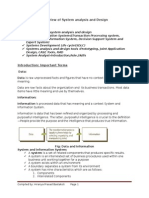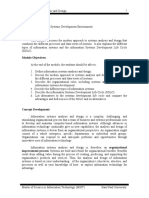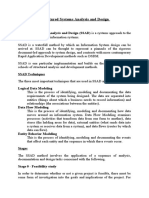Dorothy Llagasicmt 2
Dorothy Llagasicmt 2
Uploaded by
Tiffany PetersCopyright:
Available Formats
Dorothy Llagasicmt 2
Dorothy Llagasicmt 2
Uploaded by
Tiffany PetersCopyright
Available Formats
Share this document
Did you find this document useful?
Is this content inappropriate?
Copyright:
Available Formats
Dorothy Llagasicmt 2
Dorothy Llagasicmt 2
Uploaded by
Tiffany PetersCopyright:
Available Formats
Dorothy llagas
ICMT 2-5
Systems analysis is the study of sets of interacting entities, including computer systems analysis. This field is closely related to requirements analysis or operations research. It is also "an explicit formal inquiry carried out to help someone (referred to as the decision maker) identify a better course of action and make a better decision than he might otherwise have made. The development of a computer-based information system includes a systems analysis phase which produces or enhances the data model which itself is a precursor to creating or enhancing a database (see Christopher J. Date "An Introduction to Database Systems"). There are a number of different approaches to system analysis. When a computer-based information system is developed, systems analysis (according to the Waterfall model) would constitute the following steps: System analyst A systems analyst researches problems, plans solutions, recommends software and systems, at least at the functional level, and coordinates development to meet business or other requirements. Although they may be familiar with a variety of programming languages, operating systems, and computer hardware platforms, they do not normally involve themselves in the actual hardware or software development. Because they often write user requests into technical specifications, the systems analysts are the liaisons betweenvendors and information technology professionals.[1] They may be responsible for developing cost analysis, design considerations, staff impact amelioration, and implementation time-lines. A systems analyst may: Identify, understand and plan for organizational and human impacts of planned systems, and ensure that new technical requirements are properly integrated with existing processes and skill sets. Plan a system flow from the ground up. Interact with internal users and customers to learn and document requirements that are then used to produce business requirements documents. Write technical requirements from a critical phase. Interact with designers to understand software limitations. Help programmers during system development, ex: provide use cases, flowcharts or even database design. Perform system testing. Deploy the completed system. Document requirements or contribute to user manuals. Whenever a development process is conducted, the system analyst is responsible for designing components and providing that information to the developer
Scope Definition Problem analysis Requirements analysis Logical design Decision analysis Types of Information Systems and Systems Development
Transaction Processing Systems (TPS) Automate handling of data about business activities (transactions) Management Information Systems (MIS) Converts raw data from transaction processing system into meaningful form Decision Support Systems (DSS) Designed to help decision makers Provides interactive environment for decision making Types of Information Systems and Systems Development Expert Systems (ES) Replicates decision-making process Knowledge representation describes the way an expert would approach the problem Use cases are a widely used systems analysis modeling tool for identifying and expressing the functional requirements of a system. Each use case is a business scenario or event for which the system must provide a defined response. Use cases evolved out of object-oriented analysis; however, their use as a modeling tool has become common in many other methodologies for system analysis and design. Office automation Office automation refers to the varied computer machinery and software used to digitally create, collect, store, manipulate, and relay office information needed for accomplishing basic tasks. Raw data storage, electronic transfer, and the management of electronic business information comprise the basic activities of an office automation system.[1] Office automation helps in optimizing or automating existing office procedures. The backbone of office automation is a LAN, which allows users to transmit data, mail and even voice across the network. All office functions, including dictation, typing, filing, copying, fax, Telex, microfilm and records management, telephone and telephone switchboard operations, fall into this category. As office methods evolved to take full advantage of new technologies, there was a corresponding increase in innovations tailor-made to optimize office processes.[2] Office automation was a popular term in the 1970s and 1980s as the desktop computer exploded onto the scene. Advantages are: Office automation can get many tasks accomplished faster. It eliminates the need for a large staff. Less storage is required to store data. Multiple people can update data simultaneously in the event of changes in schedule
Artificial Intelligence and Expert Systems There is a class of computer programs, known as expert systems, that aim to mimic human reasoning. The methods and techniques used to build these programs are the outcome of efforts in a field of computer science known as Artificial Intelligence (AI). Expert systems have been built to diagnose disease (Pathfinder is an expert system that assists surgical pathologists with the diagnosis of lymph-node diseases, aid in the design chemical syntheses (Example), prospect for mineral deposits (PROSPECTOR), translate natural languages, and solve complex mathematical problems(MACSYMA). Our purpose in writing this description of expert systems is to demystify these programs by revealing their surprisingly simple architecture, explaining a method by which they can be constructed inexpensively, and illustrating, using a simple example, the process by which they seem to reason.
1. Distinguishing Features In conventional computer programs, problem-solving knowledge is encoded in program logic and program-resident data structures. Expert systems differ from conventional programs both in the way problem knowledge is stored and used. An expert system is a computer program, with a set of rules encapsulating knowledge about a particular problem domain (i.e., medicine, chemistry, finance, flight, et cetera). These rules prescribe actions to take when certain conditions hold, and define the effect of the action on deductions or data. The expert system, seemingly, uses reasoning capabilities to reach conclusions or to perform analytical tasks. Expert systems that record the knowledge needed to solve a problem as a collection of rules stored in a knowledge-base are called rule-based systems. Grp decision support system An exciting new concept is emerging in the area of decision support. This involves the development of computer-based systems for use by groups of people who are jointly responsible for making decisions. Known as "Group Decision Support Systems" (GDSS) they can be useful to committees, review panels, executive board meetings, task forces, and groups of managers who work together on either a regular or one-time basis. The precise design of a GDSS will vary depending on the proximity of group members to one another and the duration of the decisionmaking session. This paper presents an overview of the GDSS concept and explores issues related to the design, implementation, and study of these systems. Roles of a system analyst SYSTEMS ANALYST AS CONSULTANT The systems analyst frequently acts as a systems consultant to humans and their businesses and, thus, may be hired specifically to address information systems issues within a business. Such hiring can be an advantage because outside consultants can bring with them a fresh perspective that other people in an organization do not possess. It also means that outside analysts are at a disadvantage because the true organizational culture can never be known to an outsider. As an outside consultant, you will rely heavily on the systematic methods discussed throughout this text to analyze and design appropriate information systems for users working in a particular
business. In addition, you will rely on information systems users to help you understand the organizational culture from others viewpoints. Information systems analysts and consultants conduct research, develop and implement information systems development plans, policies and procedures, and provide advice on a wide range of information systems issues. SYSTEMS ANALYST AS SUPPORTING EXPERT Another role that you may be required to play is that of supporting expert within a business for which you are regularly employed in some systems capacity. In this role the analyst draws on professional expertise concerning computer hardware and software and their uses in the business. This work is often not a full-blown systems project, but rather it entails a small modification or decision affecting a single department. As the support expert, you are not managing the project;you are merely serving as a resource for those who are. If you are a systems analyst employed by a manufacturing or service organization, many of your daily activities may be encompassed by this role. SYSTEMS ANALYST AS AGENT OF CHANGE The most comprehensive and responsible role that the systems analyst takes on is that of an agent of change, whether internal or external to the business. As an analyst, you are an agent of change whenever you perform any of the activities in the systems development life cycle (discussed in the next section) and are present and interacting with users and the business for an extended period (from two weeks to more than a year). An agent of change can be defined as a person who serves as a catalyst for change, develops a plan for change, and works with others in facilitating that change. Your presence in the business changes it. As a systems analyst, you must recognize this fact and use it as a starting point for your analysis. Hence, you must interact with users and management (if they are not one and the same) from the very beginning of your project. Without their help you cannot understand what they need to support their work in the organization, and real change cannot take place. If change (that is, improvements to the business that can be realized through information systems) seems warranted after analysis, the next step is to develop a plan for change along with the people who must enact the change. Once a consensus is reached on the change that is to be made, you must constantly interact with those who are changing. As a systems analyst acting as an agent of change, you advocate a particular avenue of change involving the use of information systems. You also teach users the process of change, because changes in the information system do not occur independently but cause changes in the rest of the organization as well. Qualities of a system analyst From the foregoing descriptions of the roles the systems analyst plays, it is easy to see that the successful systems analyst must possess a wide range of qualities. Many different kinds of people are systems analysts, so any description is destined to fall short in some way. There are some qualities, however, that most systems analysts seem to display. Above all, the analyst is a problem solver. He or she is a person who views the analysis of problems as a challenge and who enjoys devising workable solutions. When necessary, the analyst must be able to systematically tackle the situation at hand through skillful application of tools, techniques, and experience. The analyst must also be a communicator capable of relating meaningfully to other people over extended periods of time. Systems analysts need to be able to understand humans needs in interacting with technology, and they need enough computer experience to program, to understand the capabilities of computers, to glean information requirements from users, and to communicate what is needed to programmers.
They also need to possess strong personal and professional ethics to help them shape their client relationships. The systems analyst must be a self-disciplined, self-motivated individual who is able to manage and coordinate other people, as well as innumerable project resources. Systems analysis is a demanding career, but, in compensation, an ever changing and always challenging one. . Analytical Mind 2. Good Communication Skills 3. Good Organisation Skills 4. Self direction 5. Self discipline 6. Creative System development life cycle The system development life cycle (SDLC) is the traditional system development method that organizations use for large-scale IT Projects. The SDLC is a structured framework that consists of sequential processes by which information system are developed. 1. System Investigation 2. System Analysis 3. System Design 4. Programming and Testing 5. Implementation 6. Operation and Maintenance
You might also like
- OS81050Document80 pagesOS81050ljg1314202No ratings yet
- Systems, Roles, and Development Methodologies ReviewDocument3 pagesSystems, Roles, and Development Methodologies ReviewTasmim DishaNo ratings yet
- System an Chap-1Document18 pagesSystem an Chap-1EvaNo ratings yet
- Assignment No: 1Document10 pagesAssignment No: 1vinaygirdharNo ratings yet
- System Analysis - BDocument64 pagesSystem Analysis - BAkinbote TemiloluwaNo ratings yet
- Intro To Info SystemDocument25 pagesIntro To Info SystemRomelyn JoveroNo ratings yet
- Systems Analysis and Design: Core ConceptsDocument6 pagesSystems Analysis and Design: Core ConceptsOvi Itsnaini UNo ratings yet
- SAD Module+1 Introduction+to+Systems+Analysis+and+DesignDocument22 pagesSAD Module+1 Introduction+to+Systems+Analysis+and+DesignDumm DummNo ratings yet
- CHAPTER 1-Systems, Roles and Development MethodologiesDocument13 pagesCHAPTER 1-Systems, Roles and Development MethodologiesJessicaGonzalesNo ratings yet
- Systems Analysis and Design Dr. Samali V. MlayDocument36 pagesSystems Analysis and Design Dr. Samali V. MlayBwiino KeefaNo ratings yet
- SAAD Lecture I - IntroductionDocument36 pagesSAAD Lecture I - IntroductionKisyenene JamusiNo ratings yet
- System Analysis & Design & Software Engineering: Assignment: MBA-IT-2Document16 pagesSystem Analysis & Design & Software Engineering: Assignment: MBA-IT-2Biswaranjan TripathyNo ratings yet
- Module4 AIS1 PrelimDocument36 pagesModule4 AIS1 PrelimJohn Carlo ManaigNo ratings yet
- System Integration And: Architecture 2Document8 pagesSystem Integration And: Architecture 2Marijo Bugarso BSIT-3BNo ratings yet
- Materi Pentingnya Analysis Dan DesignDocument10 pagesMateri Pentingnya Analysis Dan DesignElly JongNo ratings yet
- Programmed and Non-Programmed DecisionsDocument39 pagesProgrammed and Non-Programmed DecisionsHimanshiNo ratings yet
- UNIT-6 (DEV and Maintainence of Info Systms) 1. Systems Analysis and DesignDocument16 pagesUNIT-6 (DEV and Maintainence of Info Systms) 1. Systems Analysis and DesignH Hima BinduNo ratings yet
- IS236 Lecture 1Document42 pagesIS236 Lecture 1Nyenesya MwakilasaNo ratings yet
- Chapter 1: System EnvironmentDocument7 pagesChapter 1: System EnvironmentBijay MishraNo ratings yet
- Introduction To Application Development and Emerging TechnologiesDocument52 pagesIntroduction To Application Development and Emerging TechnologiesNicole Soriano100% (4)
- Reporting G 5Document12 pagesReporting G 5Vic-Aljari RazonNo ratings yet
- Module 9: The People in Information SystemsDocument11 pagesModule 9: The People in Information Systemsalex bascoNo ratings yet
- System Analysis and Design: Chapter One: Basic Concepts in Information System DevelopmentDocument45 pagesSystem Analysis and Design: Chapter One: Basic Concepts in Information System DevelopmentSuraphel BirhaneNo ratings yet
- The Modern Systems Analyst: The Chapter Will Address The Following QuestionsDocument71 pagesThe Modern Systems Analyst: The Chapter Will Address The Following QuestionsiremyildizNo ratings yet
- System Analyst InfoDocument5 pagesSystem Analyst InfoDiamond RealNo ratings yet
- Computer Hardware MaintenanceDocument79 pagesComputer Hardware MaintenancePushpa RajNo ratings yet
- System Development Life Cycle: Joice E Matilla BSA-3 Sir ArboDocument15 pagesSystem Development Life Cycle: Joice E Matilla BSA-3 Sir ArboRhea Mae AmitNo ratings yet
- System Analysis and DesignDocument39 pagesSystem Analysis and DesignAmna100% (4)
- Introduction To System Analysis and DesignDocument22 pagesIntroduction To System Analysis and DesignHiranya100% (2)
- MGMT 3011 Chapter 1Document15 pagesMGMT 3011 Chapter 1Samantha RamrattanNo ratings yet
- System Analysis and DesignDocument7 pagesSystem Analysis and DesignGursimar BediNo ratings yet
- Information Reporting System and Executive Information SystemDocument9 pagesInformation Reporting System and Executive Information SystemBoobalan RNo ratings yet
- Stakeholders and Their Interests in SystemsDocument4 pagesStakeholders and Their Interests in SystemsJasjit SinghNo ratings yet
- System Analysis Design UNIT 12 PDFDocument55 pagesSystem Analysis Design UNIT 12 PDFAlexis Allaga PendiodayNo ratings yet
- SAD CH-1 newDocument20 pagesSAD CH-1 newabdulmejidmohamed801No ratings yet
- Survch 1Document9 pagesSurvch 1Doaa RezkNo ratings yet
- Software System Components Inter-Process CommunicationsDocument5 pagesSoftware System Components Inter-Process Communicationswilliam_villanteNo ratings yet
- Computer Science NotesDocument73 pagesComputer Science NotesWima ShimapondaNo ratings yet
- Bdms Unit-1Document45 pagesBdms Unit-1abhaypatel199924No ratings yet
- Module Number: 1 Module Heading: The Systems Development EnvironmentDocument31 pagesModule Number: 1 Module Heading: The Systems Development EnvironmentAnonymous PcPkRpAKD5No ratings yet
- Reviewer Insy55Document14 pagesReviewer Insy55Vanessa VillaramNo ratings yet
- Lesson No: 1 Lesson Name: Overview of System Analysis & DesignDocument22 pagesLesson No: 1 Lesson Name: Overview of System Analysis & Designanon_680266406No ratings yet
- Lesson 1. The World of The Modern System's AnalystDocument10 pagesLesson 1. The World of The Modern System's AnalystMary Ivy PunzalanNo ratings yet
- MIS "Types of DSS"Document12 pagesMIS "Types of DSS"maba2610100% (1)
- The Project AnalystDocument3 pagesThe Project AnalystLiryc Andales Rosales DomingoNo ratings yet
- CSC211, Hand OutsDocument107 pagesCSC211, Hand OutsNaveed KhanNo ratings yet
- SAD CHAPTER 1-7 To StudentDocument54 pagesSAD CHAPTER 1-7 To Studentminchabay2No ratings yet
- Transaction Processing SystemDocument19 pagesTransaction Processing SystemkamleshNo ratings yet
- System Development Life Cycle (SDLC)Document28 pagesSystem Development Life Cycle (SDLC)wasiuddin100% (1)
- Q.No.1 Write Down Various Problems Associated With Traditional OfficeDocument8 pagesQ.No.1 Write Down Various Problems Associated With Traditional OfficePrerna KhatriNo ratings yet
- Structured Systems Analysis and Design MethodDocument7 pagesStructured Systems Analysis and Design MethodAkash Kumar SinghNo ratings yet
- Chapter 1-Introduction To SADDocument21 pagesChapter 1-Introduction To SADYohans BrhanuNo ratings yet
- Rafat WorkDocument8 pagesRafat WorkRosemary JibrilNo ratings yet
- SAD101 Study-Guide Module-1Document34 pagesSAD101 Study-Guide Module-1moiurb101No ratings yet
- MIS AssignmentDocument29 pagesMIS AssignmentBijay MishraNo ratings yet
- IT-510 Module 1 Part OneDocument3 pagesIT-510 Module 1 Part Onepetetg5172No ratings yet
- Group 2, Discussion #1 Chapter 1, Questions 6-10Document8 pagesGroup 2, Discussion #1 Chapter 1, Questions 6-10Ashley HicksNo ratings yet
- Module 1 Lesson 2 and 3 Systems Development Methods Tools and TechniquesDocument15 pagesModule 1 Lesson 2 and 3 Systems Development Methods Tools and Techniquesjunex tanNo ratings yet
- iIT REPORTDocument5 pagesiIT REPORTMonica CudalNo ratings yet
- Chap 1 SummaryDocument3 pagesChap 1 SummaryCGNo ratings yet
- Kudelski Audit of MantisDocument17 pagesKudelski Audit of MantisCharles HoskinsonNo ratings yet
- 3032 - A Guided Tour of The DFSMSHSM Parmlib, Part 1 of 2Document74 pages3032 - A Guided Tour of The DFSMSHSM Parmlib, Part 1 of 2gborja8881331No ratings yet
- InformaticaDocument289 pagesInformaticadharbab100% (1)
- Brain Audit Article - Writing - Syllabus - OverviewDocument15 pagesBrain Audit Article - Writing - Syllabus - OverviewAM405No ratings yet
- 227 Manual PDFDocument32 pages227 Manual PDFVirna Uli SamosirNo ratings yet
- How To Get Started in Data Analytics - A Roadmap For BeginnersDocument16 pagesHow To Get Started in Data Analytics - A Roadmap For BeginnersMuneeb ShahidNo ratings yet
- (Power BI Dashboard Creation) (Cheatsheet)Document6 pages(Power BI Dashboard Creation) (Cheatsheet)Nikhil MukhijaNo ratings yet
- History of C Programming LanguageDocument9 pagesHistory of C Programming LanguageRahul LavhandeNo ratings yet
- SRS Document Sandra LucyDocument24 pagesSRS Document Sandra LucysunNo ratings yet
- Kolej Matrikulasi KedahDocument16 pagesKolej Matrikulasi Kedahsiti aisyahNo ratings yet
- Soft Starter WiringDocument4 pagesSoft Starter WiringsultanprinceNo ratings yet
- AVEVA Bocad Offshore PDFDocument2 pagesAVEVA Bocad Offshore PDFsennimalai0% (1)
- CompareContrast - TPS Vs MIS Vs DSSDocument2 pagesCompareContrast - TPS Vs MIS Vs DSSethan71% (7)
- Prak Tik Um Statist I K 170620210610081623906608Document2 pagesPrak Tik Um Statist I K 170620210610081623906608Mira ArdeliaNo ratings yet
- Link Planner Release Notes v6.1.3Document6 pagesLink Planner Release Notes v6.1.3juanpc jimenezNo ratings yet
- 218 Choosing The Right Cocoa Container ViewDocument244 pages218 Choosing The Right Cocoa Container ViewShobana MohanasundaramNo ratings yet
- CNSSI 4009 (National Information Assurance Glossary)Document165 pagesCNSSI 4009 (National Information Assurance Glossary)Roger Mull100% (1)
- Rakesh Yadav Class Notes Math in Hindi PDFDocument423 pagesRakesh Yadav Class Notes Math in Hindi PDFpao cndNo ratings yet
- Example of LMS-BMW CompanyDocument11 pagesExample of LMS-BMW CompanyEzlinNo ratings yet
- Trocr: Transformer-Based Optical Character Recognition With Pre-Trained ModelsDocument10 pagesTrocr: Transformer-Based Optical Character Recognition With Pre-Trained ModelsNajmeddine Ben RemdhaneNo ratings yet
- GSP Animation FeaturesDocument6 pagesGSP Animation FeaturesAdibah BaharomNo ratings yet
- Chapter 4 Let There Be Light Sample ChapterDocument31 pagesChapter 4 Let There Be Light Sample Chapterjagdevs7234No ratings yet
- Manual Canon Ir ADV C2020 C2030 SETUPDocument68 pagesManual Canon Ir ADV C2020 C2030 SETUPndeso edisiNo ratings yet
- Process IntroDocument7 pagesProcess Introbsbuhazra2021No ratings yet
- Prioritizing Critical Failure Factors For The Adoption of ERP System Using TOPSIS MethodDocument15 pagesPrioritizing Critical Failure Factors For The Adoption of ERP System Using TOPSIS MethodshayanaliyannezhadNo ratings yet
- Dr. Dinesh Bhagwan Hanchate, VP's KBIET, BaramatiDocument68 pagesDr. Dinesh Bhagwan Hanchate, VP's KBIET, BaramativickyNo ratings yet
- ZTI NamesDocument8 pagesZTI NamesDaniel GråhnsNo ratings yet
- PRB3 X Ca 150421Document4 pagesPRB3 X Ca 150421Sanika TalathiNo ratings yet
- Data Sheet 6AG1124-0QC02-4AX1: General InformationDocument10 pagesData Sheet 6AG1124-0QC02-4AX1: General InformationAdnan Naeem MalikNo ratings yet

























































































